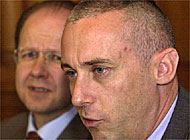Top crime-fighting officials resign over policy shortcomings

Two top officials charged with combating money laundering in Switzerland have resigned, a week after accusing the government of failing to come up with a clear strategy for dealing with the problem.
The two officials in charge of evaluating suspicious banking activities, Daniel Thelesklaf and Mark Van Thiel, will step down in November, according to a spokesman.
The reason for their resignations was not spelled out, but it is known that Thelesklaf and his deputy have been trying unsuccessfully to persuade the government to give their office more power to tackle money laundering.
The Geneva public prosecutor, Bernard Bertossa, said he was disappointed by their resignation. “We have a good relationship with them and they played an important role in Switzerland’s quest to combat money laundering,” Bertossa told swissinfo.
In Switzerland, the prosecution of money laundering cases is done at a cantonal level. If a bank or other financial institution is suspicious of a transaction, it is required to inform the Federal Money Laundering Reporting Office (MROS) in Berne.
From a strategic and legal point of view, Bertossa said the MROS, which Thelesklaf and Van Thiel headed, was an important one. “It is the only one which is entitled to receive information from financial intermediaries.”
Bertossa believes their resignation will hamper efforts to co-ordinate information between cantons. “On a strategic level, we were hoping that this office could develop its mandate to analyse information in its possession and co-ordinate the activities of the cantons. We can only hope that its important function can continue,” he said.
Bertossa said it pained him that Thelesklaf, who he described as being very experienced and knowledgeable, has left the fold. “Thelesklaf certainly has the best experience in Switzerland in terms of co-operation with cantonal authorities and financial institutions,” Bertossa said.
Thelesklaf initiated the programme to fight money laundering in Switzerland, which has only formed part of Swiss law for the last two years. “[Thelesklaf] was doing this job very well and it is obviously a problem to find someone who has the same level of experience [to replace him].” Bertossa said.
Last week, Thelesklaf hinted he might step down, telling reporters that the government’s policy towards combating money laundering was lacking in direction.
He suggested that Switzerland’s problems might have something to do with its “splendid isolation”. The country is facing heavy pressure to step up efforts against money laundering by the United States and the European Union.
Switzerland has progressively tightened its banking laws over the past three decades, but has refused to compromise on its policy of banking secrecy, despite pressure from the United States and European Union to disclose the identity of their nationals with assets in Switzerland.
Thelesklaf and Van Thiel are to go into business advising small financial institutions on how to comply with Switzerland’s anti-money laundering laws.
swissinfo with agencies

In compliance with the JTI standards
More: SWI swissinfo.ch certified by the Journalism Trust Initiative
You can find an overview of ongoing debates with our journalists here. Please join us!
If you want to start a conversation about a topic raised in this article or want to report factual errors, email us at english@swissinfo.ch.